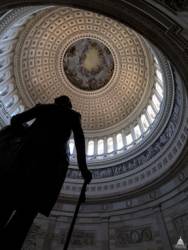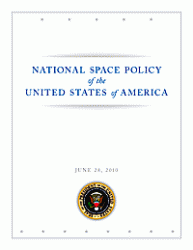
Three threads of legislation running through the new congressional session —location privacy, critical infrastructure protection, and updates to the Communications Act — are worth careful monitoring by the GPS community. One bill in particular, the Terrorism Prevention and Critical Infrastructure Protection Act of 2015, could expand the definition of critical infrastructure to include the GPS system — something GNSS experts have been advocating for several years.
Three threads of legislation running through the new congressional session —location privacy, critical infrastructure protection, and updates to the Communications Act — are worth careful monitoring by the GPS community. One bill in particular, the Terrorism Prevention and Critical Infrastructure Protection Act of 2015, could expand the definition of critical infrastructure to include the GPS system — something GNSS experts have been advocating for several years.
Location privacy was the subject of a great deal of interest during the last Congress, especially after the Supreme Court ruled police needed a warrant to attach a GPS tracker to a car. Though the ruling set down a marker, the wide-ranging reasoning behind the Supreme Court’s decision left gaps that continue to flummox law enforcement officials.
The bipartisan Geolocation Privacy and Surveillance (GPS) Act (S. 237) would clear things up by requiring the government to show probable cause and obtain a warrant for the release of location information, whether obtained directly from a tracking device or via a third party like a cell phone company. The measure applies to real-time tracking as well as retrospective location information.
The bill also addresses the sort of location-focused marketing made possible by cell phones and tablets. It prohibits companies from sharing location data with outside entities unless a customer gives his or her consent.
If passed, the bill would put using an electronic device to surreptitiously track people on par with wiretapping. Violation of the act’s provisions could result in a prison sentence of up to five years and/or a fine of up to $10,000.
The Senate version of the bill (S. 237) was introduced by Sen. Ron Wyden, D-Oregon, and the House version by Rep. Jason Chaffetz, R-Utah. Both bills were referred to their respective judiciary committees and the House bill was also referred to the Permanent Select Committee on Intelligence.
This is not the first time the Wyden has introduced language to help protect the public’s right to location privacy. A spokesman for Wyden’s office said the bill was essentially the same as had been proposed during the last two congressional sessions.
Critical Infrastructure
Security of a different kind is the focus of the Terrorism Prevention and Critical Infrastructure Protection Act of 2015 (HR 85). Introduced in the U.S. House of Representatives by Rep. Sheila Jackson Lee, D-Texas, the bill aims to assess the status of the nation’s preparations to protect its critical infrastructure, largely through a series of studies, and push the Department of Homeland security to act proactively to protect that infrastructure.
The measure has two key provisions that could be important to the GPS community. First it has a very broad definition of critical infrastructure that would certainly seem to encompass the GPS system. The bill defines it as “systems and assets, whether physical or virtual, so vital to the United States that the incapacity or destruction of such systems and assets would have a debilitating impact on security, national economic security, national public health or safety, or any combination of those matters.”
In fact, Jackson Lee’s office said specifically that GPS would be considered critical infrastructure under Section 3 of the legislation, which covers policy. In response to a question from Inside GNSS, a spokesman for the congresswoman said GPS falls under “(B) transportation and transportation systems” within the definition of critical infrastructure for the policy portion of the bill.
Section 3 directs the Department of Homeland Security (DHS) to take “proactive steps to manage risk and strengthen the security and resilience of the Nation’s critical infrastructure.” If the bill passes, the language would appear to increase pressure on DHS to support building the eLoran system.
The National Space-Based Positioning, Navigation, and Timing (PNT) Advisory Board has been discussing the need for GPS be designated as critical infrastructure for several years and has come out strongly in support of eLoran as an alternative PNT source. Building the ground-based eLoran system as a backup for GPS is now being considered by a multi-agency taskforce.
The bill, which was only introduced on January 23, does not yet have cosponsors. It was referred to the House Subcommittee on Cybersecurity, Infrastructure Protection, and Security Technologies.
Communications Act Revision
One of the most important issues slated to come before the 114th Congress is the rewrite of the Communications Act. An effort to update related statutes was launched last year by Rep. Fred Upton, R-Michigan, who has kept his chairmanship of the House Energy and Commerce Committee and Rep. Greg Walden, R-Oregon, the ongoing chairman of the Communications and Technology Subcommittee.
The pair wants to refresh the 80-year-old act to incorporate the tremendous advances in telecommunications technology made since it was last updated some 18 years ago.
Over the last year the pair issued half a dozen white papers on communications-related topics soliciting comments from stakeholders. Among the subjects on the table are receiver standards, a topic that, as the stakeholder comments underscored, often focuses on GPS receivers. They also want to re-examine the roll of the National Telecommunications and Information Administration.
NTIA is in charge of decisions involving the federal use of frequencies. Upton and Walden suggested that having both the NTIA and the Federal Communications Commission (FCC) making spectrum decisions was inefficient. The NTIA, however, has proven to be a balance against the FCC, which seems very sharply focused on telecommunications sometimes to the detriment of other uses of spectrum including PNT.
Although the update is likely to become one of the most important and contentious undertakings of the 114th Congress, little has happened so far. Neither congressman has proposed legislation and available schedules indicate no hearings on the matter before mid-March.





